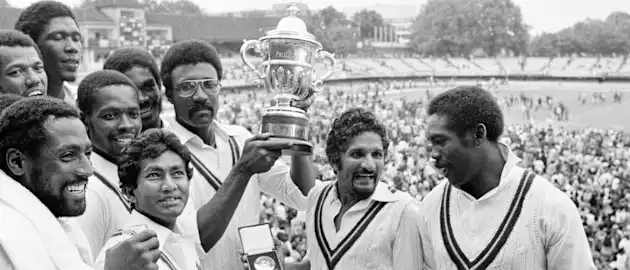A history of ICC World Cup Finals at Lord’s

Media release
Lord’s will host its first ICC Test World Championship Final this year, the latest in a storied list of showpiece occasions to be staged at the ‘Home of Cricket’.
Here is a look back at the nine World Cup showpieces which have taken place at the venue so far.
1975 – West Indies v Australia
The first-ever ICC Men’s Cricket World Cup concluded at Lord’s and the West Indies became the inaugural champions by beating Australia in the final.
Clive Lloyd top scored with 102 as the Windies set Ian Chappell’s side 292 to win before five run outs saw Australia bowled out 17 runs short with eight balls remaining of their 60 overs.
1979 – England v West Indies
The Windies defended their title in 1979 and stretched their unbeaten run in ICC Men’s Cricket World Cups to two tournaments as they beat hosts England in the final.
Viv Richards’ 138 helped rescue the Windies from a wobble as they posted 286 before a five-fer for Joel Garner helped bowl England out for 194.
1983 – India v West Indies
The trend of batting first and winning the final continued for the 1983 final at Lord’s, but this time the West Indies' grip on the trophy ended.
India successfully defended their total of 183 with Mohinder Amarnath taking the final wicket as the West Indies were dismissed for 140.
1993 – England v New Zealand
The first ICC Women’s Cricket World Cup final held at Lord’s came 20 years after the first edition of the tournament and just like in 1973 at Edgbaston, the hosts triumphed.
England beat New Zealand in this showpiece, Jan Brittin top scoring with 48 to guide her side to 195 for five before Gillian Smith took three wickets as the Kiwis were bowled out 67 runs short.
1999 – Pakistan v Australia
Shane Warne spun Australia to their second ICC Men’s Cricket World Cup victory with an imperious eight-wicket win over Pakistan in the final in 1999.
Warne took four for 33 as Pakistan were bowled out for only 132, with Australia needing just 20.1 overs to chase the total down as Adam Gilchrist scored a 36-ball 54.
2009 – England v New Zealand
The first-ever ICC Women’s T20 World Cup final was hosted at Lord’s as part of a double-header with the men’s final.
England continued their run of triumphing on home soil as they beat New Zealand, with Katherine Brunt posting three for six as the Kiwis were bowled out for just 85.
Claire Taylor steered the ship for England, who took 17 overs to chase down their total, making an unbeaten 39 as her side became the first simultaneous holders of both the T20 and ODI World Cups.
2009 – Sri Lanka v Pakistan
Pakistan claimed their first ICC Men’s T20 World Cup title as they defeated Sri Lanka by eight wickets in the 2009 final at Lord’s.
Kumar Sangakkara and Angelo Mathews were required to rescue Sri Lanka from 70 for six, with Sangakkara scoring 64 not out to help his side set Pakistan 139 to win.
Shahid Afridi ensured his side made light work of the chase, making an unbeaten 54 from 40 balls as Pakistan got home with eight balls remaining.
2017 – England v India
Anya Shrubsole delivered one of the great World Cup performances as England defeated India in a dramatic ICC Women’s Cricket World Cup final.
Chasing 229, Punam Raut’s 86 put India in a strong position, but her dismissal was the beginning of a collapse orchestrated by Shrubsole, whose figures of six for 46 remain the best in a World Cup final and saw England win by just nine runs.
2019 – New Zealand v England
Another extraordinary final followed two years later as England finally broke their ICC Men’s Cricket World Cup hoodoo in the most dramatic of circumstances.
After both sides were tied on 241 after their 50 overs, the match went to a Super Over and boundary countback was needed to split the two teams after both scored 15 – England lifting the trophy by virtue of scoring 26 boundaries to the Kiwis’ 17.
Jason Roy and Jos Buttler combined to run out Martin Guptill from the final ball of the Super Over, leading to jubilant scenes inside the Home of Cricket as the hosts won, in the immortal words of Ian Smith, ‘by the barest of margins’.
ENDS